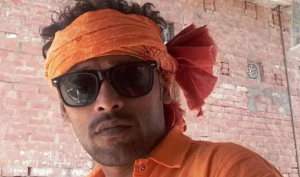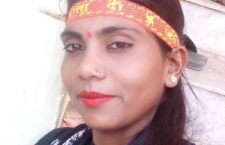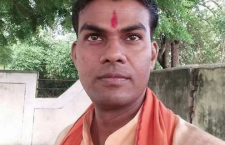“Whether it’s the HYV, the Bajrang Dal or the VHP, we’re all working for the BJP, aren’t we?”
My first official interview with the Hindu Yuva Vahini was in Banda, in April 2017. I was working on a story on the bill overruling triple talaq and wanted the views of a few Hindu organisations.
It was raining, and I showed up drenched and nervous at the mandal level office in downtown Banda for my interview with Rajesh Giri, president of the HYV’s Banda chapter. Giri spoke to me at length about the burst of new members in the HYV, and the substantial space that the organisation had begun to occupy in the public domain, documented with varying degrees of alarm by numerousmedia reports. Alliances to Yogi Adityanath were at a premium, and clearly a lot of people thought joining the HYV might get them some reflected glory and power.
Giri brushed away the significance of this phenomenon. He explained that Adityanath had quit the HYV before taking on the role of chief minister. Members of the organisation, he emphasised, were not allowed to be part of any political party. This was only one of many of the HYV’s strict rules, and applicants who couldn’t abide by them wouldn’t be accepted, he said.
Giri’s assertion—that the HYV was an apolitical social and religious outfit, unconcerned with national affairs—seemed deeply duplicitous. Though the organisation’s website is defunct, its many official or unofficially affiliated Facebook pages (most of which feature Adityanath prominently) make claims like “it seems every Muslim is fighting to make Hindustan Porkistan”, or that the HYV “seeks to provide rightist Hindu platform.”
What was the HYV if not a preparatory ground for a new, young, Hindu political class; a strong foundation for the new Hindu nation?
Devraj Singh Rajput, who joined the HYV in 2016, already had the strong foundation in Hindutva politics. His family, who owned a small general store, was earlier involved with the Bajrang Dal and in recent years had supported the BJP. Rajput’s friends recommended him to HYV leadership.
A prize-winning wrestler, Rajput was sweet-tempered and willing to take on any task. In the HYV, he was quickly promoted up the ranks from “nagar mantri” to “nagar adhyaksh”—the president of his urban unit in Banda, in charge of 31 wards and over 50 members.
Before the HYV, Rajput used to do some social work, going from ward to ward to see what problems people were facing. “If the [elected] ward member was not able to address them, I stepped in,” he told me during an interview in December 2017. “The organization saw my hard work and appreciated it.”
I’d seen Rajput around. He was a regular donor and cheery facilitator at blood donation camps at the district hospital in Banda. After joining the HYV, “well, now I have some power,” Rajput said. “I get some respect. It’s good for me, and it’s good for the people I’m trying to help. Obviously it makes a different that your government is in power.” He was sincerely convinced that there was no other organisation as committed to people and social work as the HYV, and he’d put his heart and soul into it.
He was also proud of rounding up other young men without jobs in his ward, and collectively shooing away Muslim boys who he claimed harassed Hindu girls on the way back from school. He maintained that he did so at the women’s request. Rajput made no bones about his political ambitions to me or to the HYV. “it was my family—my father and I—who converted this entire area into hardcore BJP supporters for the last election,” he claimed.
When I met Rajput at the monthly meeting of the HYV I attended in December, he was uncharacteristically disgruntled—upset because of the rumour that he had been suspended from the organisation for standing for the civic polls in UP.
When Rajput wanted to contest civic body elections in late November 2017, he said his temporary resignation from the HYV had been tacitly blessed by the leadership. So the news that members who had contested in the elections would be suspended was a shock. In any case, Rajput never got the BJP ticket he expected—a situation he was clearly surprised and disappointed by.
But when I reached out to him a few weeks later, Rajput was back to his cheerful self. When I asked if he was still upset about not getting rewarded for his work with the organisation, he tried to brush it off at first. “Whether it’s the HYV or the Bajrang Dal or the VHP, we’re all working for the BJP, aren’t we?” he said.
After a little pushing, he opened up about his feelings. “You can’t remember us only when you want the work to be done, and then keep all the tickets for yourself,” he told me. “I’ve been a member of the BJP, in the face of a lot of resistance in this area, because it isn’t a BJP base, since 2005. And the person who got the ticket from here had been in the party for a year.”
Rajput was confident that the HYV would call him back. “I don’t know of any changes in the HYV, but there’s a wedding in my family so I’m on leave right now,” he claimed. In case they didn’t, someone else would surely come knocking. “‘Everyone has my number—they know all the work I do,” said Rajput. “Whether it’s getting people’s water supply fixed, or stopping people from butchering animals in public. If I go back to politics now, it’s only if the party offers me a seat.”
Rajput might just get his wish. When we checked in with him recently, he had been accepted back into the sangathan. “Nagar Adhyaksh”, it said on his WhatsApp status. He’d be continuing the family tradition of Hindutva, maybe just under a different banner.
Reporting by Meera Devi & Kavita Devi.
Writing by Disha Mullick & Pooja Pande.
This is Part III of the Humans of Hindu Yuva Vahini series, which originally appeared on VICE India.


